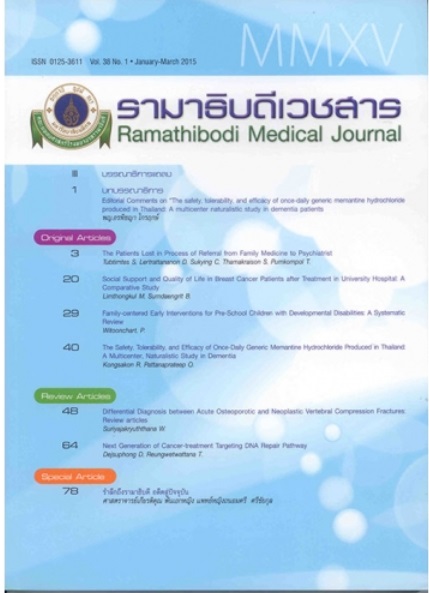The Safety, Tolerability, and Efficacy of Once-Daily Generic Memantine Hydrochloride Produced in Thailand: A Multicenter, Naturalistic Study in Dementia
Keywords:
Memantine, Efficacy, Tolerability, Naturalistic, Dementia, Generic, ThailandAbstract
Memantine has been approved in Thailand for moderate-to-severe dementia. This study aimed to evaluate the efficacy, safety, and tolerability of the generic memantine hydrochloride manufactured in Thailand in Thai dementia patients. Sixty patients from 9 centers at outpatient unit with moderate to severe dementia were received 10-20 mg the study drug one-daily for 12 weeks. Safety and tolerability were assessed through the adverse event questionnaires. Of the 60 patients who completed the study, the endpoint clinical global impression (CGI) scores were statistically significant decreased from the baseline (4.80 + 1.34 vs. 3.10 + 0.90). The common adverse events observed in this study were headache (6.6%), diarrhea (6.6%) and nausea/vomiting (5%). Inconclusion, the generic memantine used in this study was efficacious, safe, and well tolerated in Thai dementia patients.
References
Alzheimer’s Disease International. World Alzheimer’s Report 2009. London: Alzheimer’s Disease International; 2009.
Boongird P. Clinical treatment of Alzheimer's disease patients. Clinic. 2006;22:552-553.
American Psychiatric Association. Diagnostic and Statistical Manual of Mental Disorder, DSM-IV-TR. 4th ed. Arlington: American Psychiatric Pub; 2000.
Health Intervention and Technology Assessment Program and Alzheimer's and Related Disorders Association of Thailand. Bangkok: Graphico System; 2012.
Reisberg B, Doody R, Stöffler A, et al. Memantine in moderate-to-severe Alzheimer's disease. N Engl J Med. 2003;348(14):1333-1341.
Farlow MR, Graham SM, Alva G. Memantine for the treatment of Alzheimer's disease: tolerability and safety data from clinical trials. Drug Saf. 2008;31(7):577-585.
Geldmacher DS, Frolich L, Doody RS, et al. Realistic expectations for treatment success in Alzheimer's disease. J Nutr Health Aging. 2006;10(5):417-29.
Doody RS, Tariot PN, Pfeiffer E, Olin JT, Graham SM. Meta-analysis of six-month memantine trials in Alzheimer's disease. Alzheimers Dement. 2007;3(1):7-17. doi:10.1016/j.jalz.2006.10.004.
Johnson JW, Kotermanski SE. Mechanism of action of memantine. Curr Opin Pharmacol. 2006;6(1):61-67.
Guy W. Clinical Global Impressions Scale (CGI). In: Rush AJ, editor. Handbook of Psychiatric Measures. 1st ed. Washington, DC: American Psychiatric Association; 2000:100-102.
PASW Statistics 18, Release Version 18.0.0 (SPSS, Inc., 2009, Chicago, IL, www.spss.com).
Zhu M, Xiao S, Li G, et al. Effectiveness and safety of generic memantine hydrochloride manufactured in China in the treatment of moderate to severe Alzheimer's disease: a multicenter, double-blind randomized controlled trial. Shanghai Arch Psychiatry. 2013;25(4):244-253. doi: 10.3969/j.issn.1002-0829.2013.04.006.
Downloads
Published
How to Cite
Issue
Section
License
Copyright (c) 2015 By the authors. Licensee RMJ, Faculty of Medicine Ramathibodi Hospital, Mahidol University, Bangkok, Thailand

This work is licensed under a Creative Commons Attribution-NonCommercial-NoDerivatives 4.0 International License.













